
Still Human. Still Dreaming.
Still Human is the kind of heartwarming, healing film that is like catnip to me. I’ve seen this paradigm before of the Filipina maid changing hearts and breaking down barriers, but Anthony Wong and Crisel Consunji put their own stamp on it.Cheong Wing has been confined to a wheelchair ever since a construction accident. His wife divorced him and is now remarried. His son is in the States studying to be a doctor leaving Cheong Wing alone in his miniscule public assisted housing. With his closed off persona believing himself to be “rubbish” and having special needs he hasn’t been able to keep a maid. In walks Evelyn Santos from the Philippines. She speaks no Cantonese and he only speaks a little English, at first glance it does not seem like a match made in heaven as he confiscates her passport. Other Filipinas in Hong Kong tell her to play dumb and never let him know if she learns Cantonese or else her workload will be greater. As Evelyn and Cheong Wing come to know each other and see the other as human, healing and growth occur.
This film highlighted the marginalized people in the community. Evelyn and the other maids were on duty 24/6, with only Sundays off. She suffered derogatory comments and treatment almost everywhere. Cheong Wing struggled to keep his head up as he felt like a burden on his family and friends. Director/writer Oliver Chan hammered home the message that despite a person’s circumstances, as long as they were breathing, a person could have dreams. Everyone needs a purpose, a dream, something for them to reach for in life to give their experience meaning. It didn't matter if the person was old, handicapped, poor, or an other. The two characters broke down those barriers to otherness with respect and compassion.
Oliver Chan made this charming film for around 3.25 HKD/415,000USD. Anthony Wong was said to have forgone a salary. With or without pay he gave a complex performance of a man, father, friend without a reason to live only to be given another chance at meaning in his life. For the most part, Crisel Consunji held her own with Wong as the goodhearted Evelyn with a delightfully wicked sense of humor. “Sir, you even learn Japanese” as Cheong Wing attempted to hide his Japanese porn.
Still Human. Still Dreaming. If you are in need of an uplifting film to remind you that we are all neighbors, all family on this beautiful blue marble, that no one is less than, Still Human is just the ticket.
31 July 2024
Considerați utilă această recenzie?

Invitation or Cancellation?
While researching films directed by women, I found this appealing short film by Jang Yi Je. I tried to discover more about the people involved with the making of this film, but this obscure short was lost in the vast space of Pluto titled films and shows. I suppose the numerous Pluto named entertainments could offer solace to the poor bullied planet that was kicked off the starting team of planets in our solar system. #justiceforpluto! But I digress…Yeon Woo is getting married soon, but has one person she needs to see first. She visits the best friend of her childhood, the person she can’t forget. Se Jeong has a pottery studio and is less than thrilled when the familiar face drops by after too many years apart.
Pluto teased a more complex story of familial and societal expectations and judgements. As happens so often in these stories, one person gracefully accepted who she was and the other bowed to the pressure to fit in and be “normal.” How far was Yeon Woo willing to go to please others? Small hints piqued my curiosity. Based on one comment I wondered how controlling was Yeon’s boyfriend. Se Jeong had hated the pottery studio as a child and now creates works of art. I would like to have known her backstory as well. My biggest complaint other than the blown-out photography was because it was a pottery studio, the film succumbed to the overly used Ghost trope.
These short films can be maddening when they seem to have enough material for a full-length film. In a mere twenty minutes, I began to feel invested in these two women and their stories. Was their love deep enough to forgive the past and courageous enough to walk hand-in-hand into the future?
1 August 2024
Considerați utilă această recenzie?
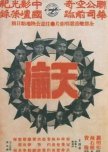
"Grant all children a place in your heart, and regard the elderly as your own"
Song of China was difficult to rate as it was a film fragment with at least one reel missing. The beginning and ending seemed to be intact, but there was a bridge of information needed to make some connections. During a time when leftist movies were being made this film called people to return to traditional values and highlighted the moral superiority of rural life. It was the first Chinese film to be shown in the USA, but it also suffered from Hollywood interference with the story editing and subtitles.A dying father beseeches his son to “Grant all children a place in your heart, and regard the aged as your own.” The son and his young family move to the city in search of better opportunities. During the early days of the Republic, his son marries. The new couple spends most of their time partying, leaving their baby in the grandparents’ care. After a time, the father decides to move them back to a rural life. He and his wife guide their grandson, teaching him Confucian values. When the father sees poor peasants outside the window as a raucous party held by his son rages on, he determines to open an orphanage and school to comply with his father’s dying wishes.
The conflicts between the generations, traditional vs modern values, and city vs country life all played out in this story of 3 generations in a family. I’m sure there was a political motivation for the return to traditional virtues, but I’m not well versed enough in the history to make an informed discussion of it.
I did find a 1936 *NYT’s review interesting. It said "The subtitles were more Chinese in flavor than the performances." The subtitles were actually translated how Americans thought the Chinese talked in a much more flowery way. The reviewer was expecting Chinese Opera style acting and found the acting to be subdued. The acting is what I liked. In early American silent films, the acting could be hammy and overdone. I quite enjoy the often more realistic acting of Chinese and Japanese silent films.
The film I watched was the shortened 45-minute version and was badly degraded. The music was appropriate though I don’t know if it was original. There is a 65-minute version somewhere. While it could be heavy-handed with the filial piety sermonizing it still had entertaining moments and was an interesting snapshot of how some people felt during this time of transition.
16 July 2024
*https://www.nytimes.com/1936/11/10/archives/song-of-china-an-allchinese-silent-picture-has-a-premiere-here-at.html
Considerați utilă această recenzie?

"Reality continues after miracles"
Dr. Storks S2 continued the stories of the doctors in the OB/Gyn and NICU departments at Persona Hospital. Miraculous stories of new life and stories of heartrending losses were shared. This time around there was also focus on the reality that faced many of the new mothers before and after the miracle of birth.Dr. Konotori Sakura with his cheerful and uplifting personality still seeks to give mothers and their babies the best chance at success. Dr. Shinomiya Haruki is there to balance our Sakura’s optimism with a strong dose of if not pessimism, a harsher view of reality. Imahashi Takayuki remains the rock of labor and delivery as the head of the department and NICU. Komatsu Rumiko, the midwife, helps keep everyone grounded and focused on the mothers’ experiences and needs. The team confronts all sorts of crises for mothers and babies alike. There would also be movement in and out of the department as people seek to broaden their educations or return from other experiences.
For my review of S1 I lamented the lack of women doctors. The OB/Gyn profession is dominated by women in my country and around half of the neonatal docs are female as well. Then I read this, “In 2018, Tokyo Medical University admitted to manipulating women applicants’ entrance exam scores for years to restrict the number of female doctors, in part because they were performing better than male applicants.” * The previous statement helped explain the dearth of women in the profession. It might also explain why the women were either portrayed as overly emotional or with almost no emotion and why one of the doctors was worried if she became pregnant she couldn’t continue to work as a physician. With all the public service announcements they had in the drama, it would have been nice to have shown competent and emotionally stable women physicians. Also, NICU nurses are the unsung heroes in that department and they were an almost invisible presence in the drama with the doctors doing all the work. Rant over.
I did like the holistic approach they had toward prenatal care and labor. The support a couple with a stillborn child had from the staff was particularly moving. The midwife, Komatsu, pushed the need for more maternal services before and after the birth. This season brought up the demand for support for postpartum depression, birth defects, and multiple miscarriages. Another topic of interest presented remote places with limited medical facilities. Women carried a great burden along with their babies if doctors were too far away. Without babies, remote places’ futures came into question.
If S1 was about the miracle of life and birth, S2 dealt with the reality of life of not only birth, but after the baby was taken home. Much emphasis was also put on teamwork both with the doctors and patients. Doctors and new parents need emotional support and also support in order to become better at what they do. While I enjoyed S2, I didn’t find it as compelling as S1.
“If you want to go fast, go alone. If you want to go far, go together.”
27 June 2024
*https://geographical.co.uk/culture/countries-with-the-most-female-doctors
Considerați utilă această recenzie?
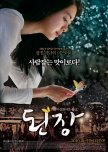
"You wait"
The Recipe began with a transformative bowl of stew and then worked its way backwards to the origin of the enthralling recipe. There were slow moments where the film tended to get lost in the weeds of the intricacies of making Doenjang Jjigae, but all was forgiven as the investigation finally revealed the truth.After his execution, Kim Jong Gu’s last request sets investigative reporter Choi Yoo Jin on his tireless quest to discover what kind of stew would be the murderer’s last thoughts. As Choi digs into the story he ascertains that the stew was so fragrant and delicious that Kim never felt the cuffs being put on. In fact, the officers were frozen at the tantalizing smell. In his efforts to track down the woman who made the doenjang, he meets one by one all the people who helped with the extensive steps she took to make the magic happen. Choi’s boss isn’t enraptured with the tale but that doesn’t stop the intrepid reporter until at last he learns how love and tears contributed to the story.
While I enjoy recipe detective work, the fine details of each step of the process often bogged the film down. If you are watching for Lee Dong Wook, you may be disappointed. He doesn’t show up until over an hour into the film. This was largely Ry Seung Ryong’s film as Choi Yoo Jin. The veteran actor showed Choi going from cynical to obsessed over the effects the stew had on people and the extraordinary details that went into it. Finally, his journey would lead him to the tragic love which inspired Jang Hye Jin’s recipe.
Anna Lee (Lee Suh Goon) directed and co-wrote this film. Her painstaking attention to food and ingredients and all the people whose hands touched the different elements was intriguing. In the same way Hye Jin had to wait on her soybean paste to ferment, this film will make you wait for the emotional payoff. Ultimately, the conclusion I came to was one any child or grandchild knows instinctively, food made with love and loving attention is the best.
17 June 2024
Considerați utilă această recenzie?

The Moon Has Risen
4 oamenii au considerat această recenzie utilă
"Try what you can, then you'll find what you like"
The Moon Has Risen was a charming, sweetly funny film written by Ozu Yasujiro and directed by prolific actress Tanaka Kinuyo. A father living with his three daughters, all of marriage age, would have to brace himself as the matchmaking and romancing were about to escalate with the full moons.Asai Mokichi lives in Nara with his three daughters. He has a hands-off approach with their love lives, letting his daughters do as they will. Chizu is the eldest daughter and a widow. She is traditional and loves caring for the family and her father. Ayako, the second daughter, is quietly shy, and falls somewhere between modern and traditional. Much to her consternation, her aunt is always trying to set her up with marriages she has no interest in. Setsuko, the youngest at 21, is effusive and effervescent. She is close friends with Shoji, a man who is currently living on the premises and unemployed. Shoji’s friend, Amamiya, visits for a while during a business trip. Setsuko and Shoji join forces to matchmake for Ayako and Amamiya when they see how much the two care for each other. The course of true love never runs smoothly, and that goes for Setsuko and Shoji as well!
Many Ozu story elements were to be found. A widowed father, played by Ozu regular Ryu Chishu, had daughters of marriage age. This time though, no one was overly worried about the father being left alone. Chizu enjoyed caring for her father, but even she may have had a love match. No older male friends were called in to help find potential mates, the sisters took care of their own futures. And each other. I loved the sisters’ relationships with each other. I worried that I might find Setsuko annoying as she attempted to bring Ayako and Amamiya together, but after the first few scenes, I found her to be a fun character and appealing. Watching the relationship grow between Setsuko and the aimless Shoji was compelling as well.
This was Tanaka Kinuyo’s second directorial effort and I thoroughly enjoyed how she framed shots. It might have been an Ozu script but she didn’t stay cemented to shooting from the mat as he did. Nor were there the head on conversations directly to the camera and overly controlled acting. Her characters moved fluidly and gracefully. She used beautiful outdoor scenes, tranquil temple locations, and gorgeously composed rooms to great effect. The characters were more tactile and looser than in an Ozu film. The family even had a pet dog! The humor was gentle and felt authentic to the story. I found Tanaka’s style of directing very relaxing.
The Moon Has Risen was an endearing film about three sisters as they carved out futures for themselves and when they faltered there was always a sister around to give destiny a little push in the right direction. Tanaka Kinuyo tied everything together with her own method of directing and extracted excellent performances from the actors. Only the second Japanese woman at the time to direct a feature film, she proved herself well. Oh, and Mizoguchi Kenji, you were wrong, she had plenty of brains to direct.
16 June 2024
*Mizoguchi was against Tanaka directing, stating, she “does not have enough brains to be a film director.”
Considerați utilă această recenzie?

A young woman is heading home late at night. When she arrives at the parking garage at her apartment complex her boss calls. She needs to redo her work and have it done by midnight. Put out at the late night order, she accidentally leaves her phone in the car. That’s when things go from bad to worse.
Director Oh In Chun showed how isolated a person can be and feel when threatened. And also how the brain and body can freeze from fear. I don’t know the name of the actress but she accurately portrayed the initial irritation a person would feel at an annoying person disturbing her work and quiet late at night. As the realization of her predicament slowly sank in her face and actions grew more frightened.
If you’ve ever been face to face with a fight or flight scenario when neither response is a viable option, you’ll recognize the terror inherent in the situation. For long time horror fans this will likely feel tame. As for me, I’ll double-check my locks tonight and make sure my phone is charged.
9 June 2024
Spoiler hint for the urban legend below
*
*
*
*
*
*
*
*
*
*
*
*
*
*
*
*
From what I read (@cocomila on YT), the symbol drawn on the door means Beta---
Alpha: empty home
Beta: female home
X= saw the inhabitant (usually female) alone or about to rob
And people from my country know the punchline from the story kids tell each other to scare themselves,
“The call is coming from inside the house!”
Definitely going to re-check those locks now!
Considerați utilă această recenzie?
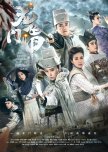
Flying Swords of Dragon Gate
4 oamenii au considerat această recenzie utilă
"The more secrets you know, the sooner you will die"
Flying Swords of Dragon Gate Inn was a weirdly addictive drama despite uneven storytelling and even more uneven acting. If you are looking for a drama centered around the famous Dragon Gate Inn, look elsewhere. This inn might as well have been named the Flamingo Palm Tree Inn as little as the mythology of the inn played into the story. If, like me, you see where Nie Yuan is listed as a main character, prepare to be disappointed. His Zhao Huai An was a supporting character who occasionally lent emotional and martial arts support. This was primarily a palace drama and a case of missing royal twins who grew up to be the princess and crown prince. The only trouble was, only one person knew how to identify them and he wasn’t talking.There will be slight spoilers from the first few episodes in the next *two paragraphs* to follow because the synopsis is not what this drama is about, if you want to avoid them, please skip down to general comments:
*The emperor’s consort Lady Lan bears him twins while he is away. The jealous empress manages to steal the girl baby while Dr. Feng quickly takes the boy child and gives him to General Yu who hands the baby off to Zhao for safe keeping. The eunuch and close ally to the empress, Wan Yu Lou, accidentally kills Lady Lan. The emperor returns to find Lady Lan dead and only a deformed daughter that he orders to be killed. Wan and the empress work to cover up their vile deeds with Wan agreeing to secretly adopt the baby princess. The two are determined to find the missing crown prince as well.
*Twenty years later Hu Zhong Yu is one of Zhao’s disciples, though Zhao isn’t around much. Hu also vowed to protect the young master of the Ma clan, Ma Tian You. When the Wanma Hall is destroyed and the young master goes missing Hu goes in search of him. During this time, he rebuilds the Dragon Gate Inn with the help of the Xia princess Bu Lu Du and tomb raider Gu Shao Tang. Later, Hu sees Tian You entering the palace grounds and follows him. Dressed as a eunuch Hu ends up serving the Western Depot under You Jia and his second in command Yu Hua Tian, a no-nonsense warrior who unknowingly to You is one of the adopted daughters of the evil Eastern Depot commander, Wan Yu Lou. Hu and Yu find themselves going from adversaries to allies as they struggle to survive the dangerous politics of the palace driven by an incompetent emperor and a treacherous Eunuch Wan.
This drama focused on the relationship between Hu Zhong Yu and Yu Hua Tian. The two actors had a nice chemistry together and were fun to watch. The other dominant stories involved Wan and his “daughters” and how he used them to gain power and advantages over his enemies. Zhou Huai An and Jin Xian Gyu showed up to guide the patriotic rebels against Wan and to give sage advice. Two of the most annoying characters to ever set foot in Dramaland were the princess Bu Lu Du and tomb raider Gu Shao Tang. They bickered non-stop and fought over Zhong Yu for 38 ½ episodes. They were childish and downright dangerous to have as allies. With the exception of Yu and Jin as the drama progressed, most of the female characters were not shown in a positive light. Thankfully, Yu, for the most part, was a thoroughly competent warrior and character. She protected those she loved and was unafraid to stand up to evil. On a side note, I was happy to see old kung fu movie star, David Chiang, in the role of Dr. Feng.
While there were scenes at the Dragon Gate Inn, they were few and far between. Most of the action took place at the palace. The “Who’s your daddy?” storylines gave a slightly different angle to the usual fight for the throne trope. It also changed relationship dynamics when people thought they knew who the royal children were and caused heartache as well. The censors could be felt when characters awkwardly declared that love was only between a man and a woman. This sentiment was largely overshadowed as one of Wan’s daughters deeply loved Yu thinking Yu was a male eunuch. Hu fell in love with Yu thinking the same thing. Both still loved Yu when “he” was revealed to be a woman. Love was love regardless of gender which felt like a bold step for a Cdrama. Flying Swords of Dragon Gate Inn could be campy and fun, dark and emotional, with terribly uneven acting and annoying characters, but it was also hard to stop watching.
27 May 2024
Considerați utilă această recenzie?

Treeless Mountain
4 oamenii au considerat această recenzie utilă
Grade schooler Jin and her little sister Bin are dropped off at their paternal aunt’s house when their mother goes in search of their missing deadbeat father. As the mother leaves, she hands Jin a red piggy bank and tells her when it is full of coins they earn for doing chores for their aunt, she’ll return. Their aunt who doesn’t work and drinks too much soju does the bare minimum for them and sometimes not even that. The girls often find themselves alone and fending for themselves or asking a neighbor for food. Jin, who was a good student, is no longer enrolled in school. Despite their circumstances the girls stick together and look for ways to earn money to fill their piggybank.
This film eschewed dramatic music for natural sounds or the girls singing. The young actresses gave beautifully genuine, unpretentious performances. They carried the weight of the movie on their tiny shoulders as the story was seen through their eyes. It was agonizing watching Jin slowly piece together the reality of her life after the harsh realization of their situation hit her. Each emotional blow would rock her and she would slowly absorb the new information and try again. Kim Hee Yeon’s eyes told the depth of Jin’s pain. Though the girls were shuttled about, they stayed together and never gave into despair, always making the best of their lives.
Treeless Mountain demonstrated how vulnerable children are and how resilient they can be when they shouldn’t have to be. There were moments that were genuinely heartbreaking as Jin came to realize that adults lie and had let her down repeatedly and others that were filled with hope when she offered all she had to someone in need. This film will cause you to want to show great kindness to any children in your life-to cuddle them and fill their bellies with warm food and shelter them from all danger. Not every child has that security, some sisters live on a treeless mountain with only each other to truly depend on. While this slow meditation on the perils of childhood may not be for everyone, I found it to be deeply moving.
21 May 2024
Considerați utilă această recenzie?

K Food Show: A Nation of Kimchi
4 oamenii au considerat această recenzie utilă
"Don't criticize other people's customs and don't criticize their kimchi!"
Heo Young Man, Ryu Soo Young, and Mimi traveled the country trying and discovering new takes on kimchi and relishing the traditional ways of making it on A Nation of Kimchi.Like the other K Food Shows, our adventurous hosts embraced their roles as food guides whole-heartedly. They demonstrated how “Kimchi shows Korea’s history, culture, and lifestyle.” Nothing else embodies Korea quite as much. Archaeologists have discovered the making of kimchi dating back as far as the Three Kingdom Era (220-280 C.E.). The oldest mention in writing goes back to a poem in 918 C.E. Since that time Koreans have experimented using different plants, seafoods, and spices. The introduction of chili peppers during the Joseon era caused an explosion of new taste sensations and the familiar red color known today.
Seasonal and regional ingredients and differences were examined. “Don’t criticize other people’s customs and don’t criticize their kimchi.” The crew visited restaurants, food stalls, and two temples. At the first temple the head monk used lotus flowers to make kimchi dishes into stunning artwork. At the second temple, the community gathered yearly to pick the vegetables and make the kimchi to be served there.
If kimchi is the heart of Korea, women make that heart pulse. In all the scenes of kimchi being made throughout the country, it was the women working together to lovingly produce it. When Ryu helped out, he was the only man among tables of women massaging the red filling into the cabbage leaves. Heo made the statement, “There are as many kinds of kimchi as there are mothers in the world.” These women might adhere to family traditions, but many of them pushed the boundaries, willing to experiment with new ingredients and combinations. “Gimjang”, the community making of kimchi, has been recognized as a UNESCO Intangible Cultural Heritage.
Whether served with wine or makgeolli, used as a side dish or main dish, in traditional combinations or new imaginative ways, the hosts enthusiastically tried them all. I enjoyed learning more about the history and making of kimchi as well as the nearly endless ways of serving it by people who demonstrated a deep love and appreciation for the national culinary treasure.
20 May 2024
Considerați utilă această recenzie?
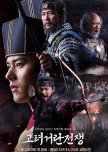
The Goryeo-Khitan War
4 oamenii au considerat această recenzie utilă
"Goryeo is more resilient than we thought"
I had been looking forward to watching the historical Korea-Khitan War as it wasn’t a fantasy or focused on the romantic involvements of the king or other characters. I ended up having mixed reactions to the varied approaches to history and the different levels of acting abilities.Goryeo was dealing with its larger and more aggressive neighbor, the Liao Empire run by the Khitans. There had already been one invasion by the Khitans which had been repelled but led to concessions on both sides. After a coup, Gang Jo has the teenager Hyun Jong coronated king. The Khitans use the coup as justification for another invasion and for the people of Goryeo and their new king it won’t be the last.
When the drama focused on the historical events of the invasions, I found it quite compelling. This small country stood its ground and used every trick and resource it could to repel the invaders. I became deeply invested in characters like Kang Kam Chan, Yang Kyu, Kim Sook Heung, Ji Chae Mun, and even the Khitan general Xiao Pai Ya. Goryeo not only dealt with the enemy across the border but the enemy within, as traitors opened their gates to the invaders or planned to cooperate with the Khitans. After the Khitans were successfully repelled the second time, the drama lapsed into internal conflicts for around 14 episodes that apparently were not based in historical evidence which I found disappointing. When they once again faced the Khitans, more prepared for their familiar enemy, the drama picked back up for me.
The battle scenes required an understanding that with a limited budget, armies of over 100,000 troops were going to be represented by two dozen people. Battle fields that should have been hip deep in bodies and blood were suddenly washed clean with no one there. For the most part when they showed the fighting up close and the stakes involved it was easier to buy in. The battle at Heunghwajin was done quite well. I was hoping to see the damming of the river battle in the third invasion, but that was likely beyond their budget.
Some of the acting was quite good. Choi Soo Jong as the rigid and canny Kang Kam Chan gave a brilliant performance. Ji Seung Hyun as Yang Kyu was quite believable as the determined warrior who could adapt and improvise on the battlefield. The deep voiced Kim Tae Han as Xiao Pai Ya provided the perfect foil for Kang Kam Chan. There were some limited performances by many other characters that often pulled me out of the moment. The drama focused much of its attention on the saintly, emotional king, but I found him to be one of the least interesting characters and performances. The amateurish camera pans of obvious reaction shots of people being wide-eyed, open-mouthed shocked in the court were overused. The villains, Emperor Shengzong of Liao and Park Jin of Chungju, were overacted and did everything but twirl their mustaches to let you know how evil they were.
When Korea-Khitan War focused on the war, it was engrossing to see how the Goryeo army was going to outfox and outfight the larger armies of the Khitans. When it lapsed into endless political jockeying and arguments, focusing on less compelling characters and actors, it lost some steam and historical integrity.
20 May 2024
Considerați utilă această recenzie?

"This is personal" Well, of course it is...
Triple Threat had an embarrassment of martial artists riches and also embarrassingly bad dialogue, even for an action movie. The martial arts were also short shrifted in lieu of guns and things that go boom far too often.Payu and Long Fei have been hired to help with a “humanitarian” mission that turns out to be anything but. Local security for the site, Jaka, loses his wife in the deadly firefight that erupts when the mercenaries enter the village to release Collins, a notorious terrorist. Payu, Long Fei, and Jaka develop a tenuous partnership to bring down the mercs and end up protecting a Chinese heiress/local philanthropist along the way.
The firefights were often over the top as the bad guys mowed down people throughout the small country of Maha Jaya. Things were always more interesting when the guns were down and the fists and kicks were up. Tony Jaa, Iko Uwais, and Tiger Chen all have experience with fighting on screen and choreography. The weakest of the three was Tiger as his fights often looked slow and uninspired. Tony and Iko were far more entertaining as they defied gravity with their flexibility, quickness, and strength. Bad guy, Scott Adkins, was able to keep up with the kicks as was Michael Jai White. Jeeja Yanin had what amounted to a glorified guest role and didn’t have many chances to show her skills.
The action came fast and furious with the fighters and heiress on the run. Unfortunately, some of the acting and much of the dialogue was painfully cringeworthy. Not much effort was made to create a cohesive story either. As a check your brain at the door, let’s watch Tony Jaa fly and flip, it was rudimentary martial arts action entertainment.
15 May 2024
Considerați utilă această recenzie?

"Impossibilities are what make this world interesting"
The Sealer was a short drama involving a secret organization that seals blades filled with “filth” such as malice and hatred and causes the humans wielding them to disappear. A reporter who can see the evil black haze emitted from the demons and swords becomes involved with the group and aids in needed research to help one of their own.The premise of the story was interesting if dark. Anyone dealing with anger or other strong emotions could become a victim of the sword and then be turned into mindless killers, even good people. The Sealers absorbed the “filth” from Blades of Filth until they could no longer contain that “filth”, then they were eliminated lest they become demonic as well. Not a great retirement plan or selling point for new candidates. Over the centuries, no one figured out how to resolve some of the more problematic issues. Karen, the maker of the scabbards that sealed the evil blades, believed that scabbards could be made that would save the humans attached to the blades and grant them the ability to atone for their deeds instead of disappearing. The blades were similar to Mordor blades, wounds caused by them would never heal.
Most of the characters were flatly drawn and acted. The characters wore basically the same clothes throughout the episodes. Sanjo, the overly earnest reporter, needed a pair of trainers as many times as she fell down and couldn’t get back up. In fact, characters falling down and being unable to stand afterwards was a common theme. I counted at least nine times it happened, as if they were all part turtle with no way to get up once down.
The Sealer was entertaining for a short drama, but being so short often left the characters underdeveloped as well as the story. There were times characters just stood around and watched what was happening with little to do. Many of the action scenes felt redundant, yet the stakes were high. For the most part The Sealer kept my attention except when I wasn’t wondering what evil spell caused people to freeze on the floor instead of attempting to escape a sword wielding demon.
6 May 2024
Considerați utilă această recenzie?
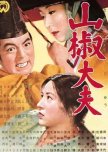
Sansho the Bailiff
4 oamenii au considerat această recenzie utilă
"A man is not a human being without mercy"
Sansho the Bailiff had little to do with the title character and everything to do with two noble children sold into slavery to him. A family torn apart never let the dream die of being reunited one day. They would all have to decide if they should continue doing the right thing when good things happened to bad people and bad things happened to good people.A governor who refuses to let the military conscript and further tax his people who have experienced famine for 13 years is stripped of his title and exiled. Before he leaves, he tells his son to remember that “A man is not a human being without mercy…Everyone is entitled to their happiness.” He gives Zushio the treasured family statuette of Kannon, the Goddess of Mercy to keep with him. His wife Tamaki and the two young children stay for a time with her brother and then determine to make the long trek in search of the father. Along the way they are betrayed in an area rife with bandits and slave dealers. Tamaki is sold into prostitution on a distant island and the children are sold into slavery to Sansho the Bailiff. Sansho is a cruel slave owner who keeps his slaves in a walled compound. Any attempt at escape results in a branding on the forehead. Sansho’s son, Taro, is kind to the children and tells them to endure until they are old enough to escape and make the difficult journey to their father. He then leaves the compound, never to return. As the children age, Anju adheres to her father’s words of wisdom while Zushio abandons them and in a twist of fate becomes the cruel "son" Taro could never be.
Calling out injustice was a familiar theme for Mizoguchi. In this film, the barbarism of forced labor camps was brought forth. More than once, the suffering of the common people was dismissed as unimportant by the affluent leaders. Much as his sister in real life had been, Tamaki was sold into prostitution. Despite the longing and despair of the characters, the scenery was amazing. Cinematographer Miyagawa Kazuo brought great beauty to the black and white film with stunning outdoor shots. Mizoguchi used water in several scenes—a lake and the ocean providing two of the more powerful moments in the film. Sansho’s slave encampment was claustrophobic and filthy, dark with hopelessness hanging over the weary people.
Sansho the Bailiff was based on a 1915 short story which was based on an old folk tale. What is curious about the title of the film was that Sansho was the villain and appeared far less than Zushio and Anju who were sold into slavery to him. Instead of Sansho’s story this was the boy Zushio’s as he grew into manhood. The mother and children were given different names along their journeys of suffering and as they sought to hold onto and rediscover their identities. Zushio’s growth and quest to reunite his family was the narrative backbone to the film. And if his growth was the backbone, Anju’s and Tamaki’s loving persistence was the life-giving blood of the film. Both women had deeply poignant scenes that will linger in my mind. Anju had a devastating scene that far from being melodramatic was like ripples through time that would affect other characters’ lives. And like those ripples the good done by the family members spread ever outward even when the family paid the cost. Sansho the Bailiff juxtaposed man’s cruelty and ability to be merciful, an ongoing battle even now as humankind decides who they want to be when they grow up.
15 April 2024
Considerați utilă această recenzie?
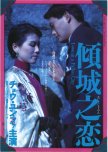
Love in a Fallen City
4 oamenii au considerat această recenzie utilă
"Compared to the cosmos, how tiny we are!"
Two people dancing around a relationship struggle to understand each other’s feelings and even their own as the clock ticks down to the Japanese occupation of Hong Kong in Love in a Fallen City. Chow Yun Fat was sizzling as the westernized playboy who takes an interest in Cora Miao’s solemn divorcee.Pai Liu Su is being pressured to attend the funeral of her ex-husband. She’s been living with her family the last 7 years ever since she walked away after the brute had beaten her. In an explosion of words, her family tells her what a burden she’s been and how she never should have gone through with the divorce. All this despite the fact her brother lost her fortune in bad investments. Mrs. Hsu, a family friend, takes Pai and her younger sister to meet a couple of eligible men. Pai and Fan Liu Yuen hit it off before he leaves for Hong Kong. Mrs. Hsu invites Pai to accompany her to Hong Kong and stay as her guest. Pai and Fan grow closer as they spend time together, yet neither is sure of the other’s motives. Pai fears she will be just another notch in Fan’s belt and Fan fears Pai is only using him to get of out of her toxic household. Will the coming invasion drive them further apart or into each other’s arms?
“Life, death, and parting are immense things beyond our control.”
Chow Yun Fat brought the heat as he wooed the introverted Pai. I’d seen him in a number of action movies but here he turned on the charm and romance. It was hard to understand what Fan saw in Pai who appeared sullen most of the time. He seemed to enjoy the fact she was traditional, though untraditional enough to divorce and also to spend time with him.
“Laws can change from day to day, but morals and ethics, kinship and family, these things don’t change”
I’ve seen my share of Shaw Brothers kung fu movies filmed on their studio lots and with familiar exterior shots so it was a pleasant surprise to see the care and creativity allowed in this film. Hong Kong was explored and many scenes were filmed at the Old Repulse Bay Hotel. I was also pleasantly surprised to see so many women involved in the making of this film. Ann Hui was the director, it was produced by Mona Fong, and based on Eileen Chang’s novella. Violet Lam won the Best Original Film Score at the HKFA for her work.
“If everything should burn down, blow up, collapse, perhaps this wall will be left.”
I was confused by the timing of the story. The story took place from 1939-1941 approximately. My knowledge of Chinese history is minimal at best so my concerns may be over nothing. The Japanese occupied Shanghai by 1937 where the story began and there was no mention of their presence there in this film.
“Life’s never over for the poor.”
Despite Pai’s consistently somber attitude and the impending war, the movie never devolved into melodrama. Pai and Fan gradually worked their way through the problems hurled their way. The film clocked in around 90 minutes, short enough for the story to not become too maudlin and long enough to fall in love with Chow Yun Fat’s Fan Liu Yuen.
12 April 2024
Considerați utilă această recenzie?

 54
54 191
191 11
11






















